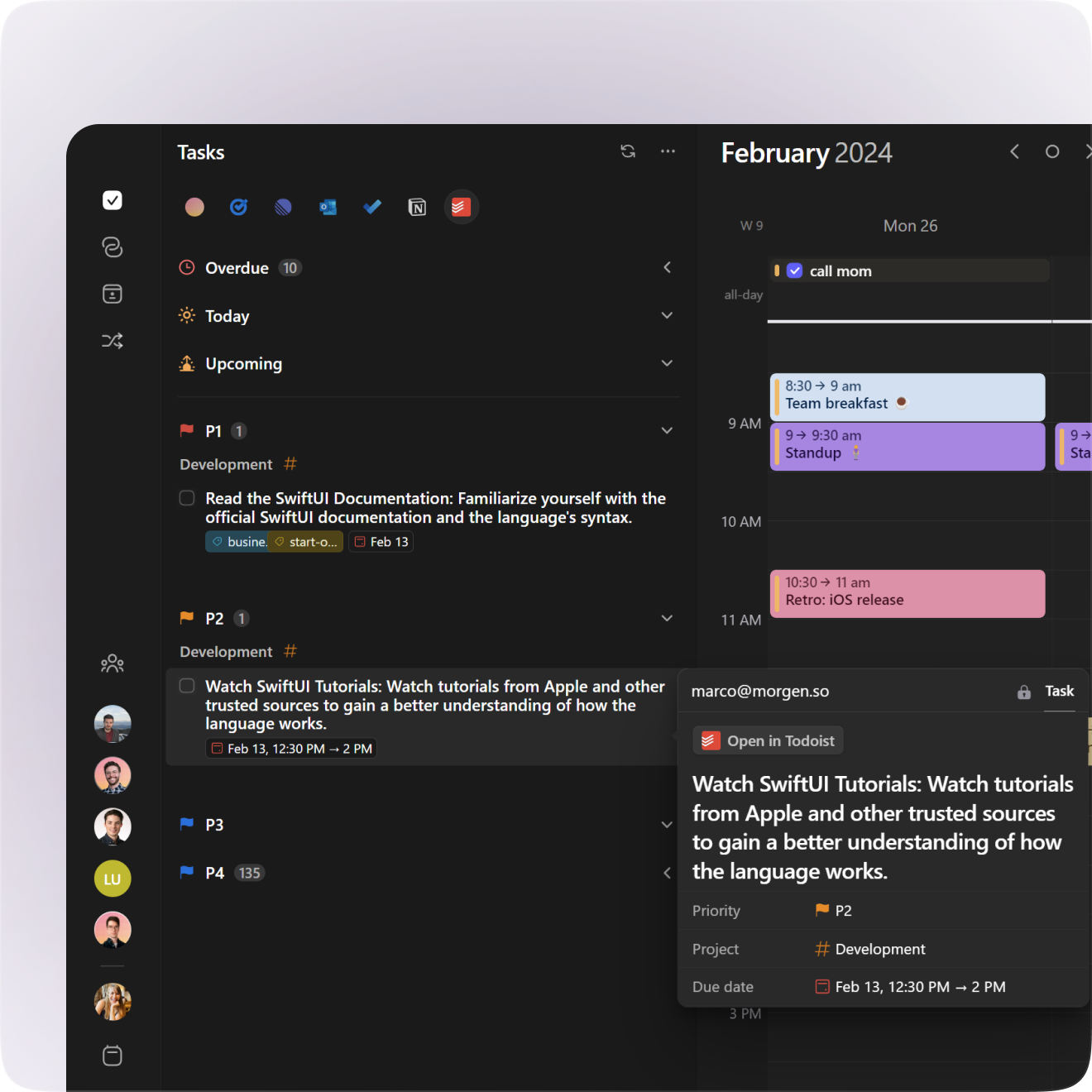Once you've connected your Notion databases with Morgen, you can start scheduling time to work on your tasks right in your calendar.
Why time block in Morgen?
Time blocking is an effective strategy for moving away from chasing never-ending to-do lists, to realistically assessing, prioritizing, and planning when you will work on each task. For a lot of people, this is the critical step in building realistic plans.
Because Morgen brings all your calendars together, time blocking here is done with a complete understanding of your competing commitments. When you take into account your time holistically - your meetings, deadlines, family events, class schedule, etc. - you can not only see when you have available time, but also predict your likely energy levels.
It also makes it easy to time block tasks:
- Based on their importance at that time. If you use the AI Planner, it will recommend which Notion tasks to work on next based on your availability and the Morgen Priority Factor algorithm.
- In different calendars, assigning some to your work calendar, others to your personal calendar, etc.
- To protect your time. When you mark scheduled tasks as busy, you'll protect that time from double bookings from colleagues or those using your Scheduling Links.
- In the right duration. Some tasks are quick and easy, and great to stack against one another. Others require deep focus and potentially multiple sessions. You can extend the length of sessions, copy multiple time blocks for a particular task, and easily move them when the unexpected come up.
Time blocking your Notion tasks
With Morgen's Notion integration, you can time block your Notion tasks into any connected calendar in Morgen (including Outlook, Apple Calendar, Fastmail, and more). Do so manually by dragging and dropping tasks into your calendar or have the AI Planner recommend which tasks to work on when.
Your Notion scheduled tasks are easy to distinguish in your calendar. All scheduled tasks in Morgen are empty of color (other than the outline) and have an empty check box just waiting for you to mark them as complete. Additionally, Notion tasks will include the logo in the upper right corner. (Clicking the logo will bring you back to that specific task in Notion.)
.png)
When you have large tasks that may require more than one session, we recommend enabling the AI Planner to split them into smaller work sessions. Alternatively, once a task is scheduled, you can copy it (CTRL/CMD C), click elsewhere in your calendar, then paste it (CTRL/CMD V). You can do this as many times as you want with the same task to create as many working sessions as you need. It's important to note that for tasks with multiple work sessions, Morgen will only update the status as complete in Notion, when that task is checked in the task list.
Additionally, once a task is scheduled, you can tune the task further. For instance, click on the task to open the widget, then:
- Change which calendar the task is scheduled in. In Morgen you select a default calendar for scheduled tasks, but you can modify it within the task if you want a task to be added to a different calendar than the default.
- Mark it busy or free. During set-up you will choose whether scheduled tasks should by default be considered busy or free. This can always be adjusted in each scheduled task. This is particularly relevant if you want your colleagues or those using your booking links to see that time as available for meetings or if you want the time protected for focused work.
- Add additional notifications for important tasks. Note that these types of reminders will be served on desktop and browser only.
- Make scheduled tasks public or private in the case that others have visibility into your calendars.
- Change the duration by pulling down or pushing up the bottom of the scheduled task frame. (Otherwise, any tasks with a duration property will default to that amount of time when added to the calendar. Alternatively, if your databases don't use a duration property, you can add a duration tag in the title or notes of your task, ex. [30m] or [1h] will be interpreted as 30 minutes or 1 hour.)
Completing your Notion tasks
When you’ve completed your task, simply check the open box in the scheduled task or in your task list. It will then be archived in Morgen, removed from your task list, and marked as complete in your calendar if it was scheduled.
The status will also be updated in Notion, based on how you configured the integration.
.png)



